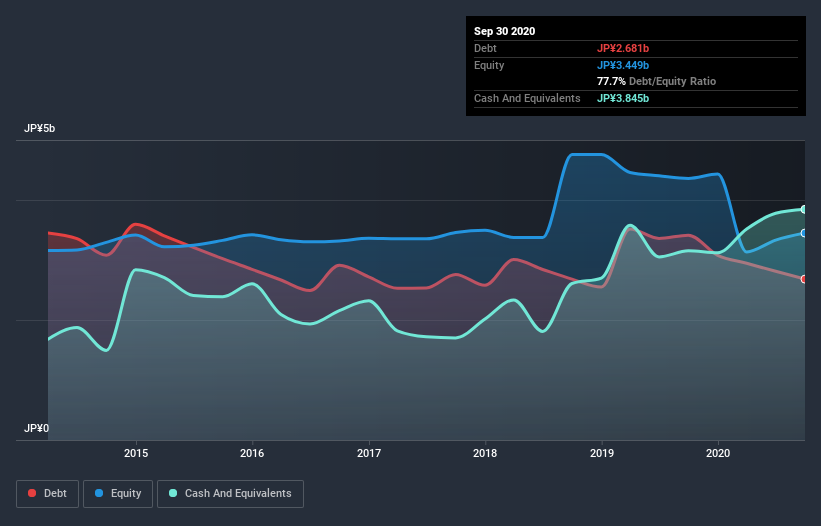
The external fund manager backed by Berkshire Hathaway's Charlie Munger, Li Lu, makes no bones about it when he says 'The biggest investment risk is not the volatility of prices, but whether you will suffer a permanent loss of capital.' So it might be obvious that you need to consider debt, when you think about how risky any given stock is, because too much debt can sink a company. We note that Sanyodo Holdings Inc (TYO:3058) does have debt on its balance sheet. But is this debt a concern to shareholders?
Why Does Debt Bring Risk?
Debt is a tool to help businesses grow, but if a business is incapable of paying off its lenders, then it exists at their mercy. In the worst case scenario, a company can go bankrupt if it cannot pay its creditors. While that is not too common, we often do see indebted companies permanently diluting shareholders because lenders force them to raise capital at a distressed price. Of course, debt can be an important tool in businesses, particularly capital heavy businesses. The first step when considering a company's debt levels is to consider its cash and debt together.
Check out our latest analysis for Sanyodo Holdings
What Is Sanyodo Holdings's Net Debt?
The image below, which you can click on for greater detail, shows that Sanyodo Holdings had debt of JP¥2.68b at the end of September 2020, a reduction from JP¥3.41b over a year. However, its balance sheet shows it holds JP¥3.85b in cash, so it actually has JP¥1.16b net cash.

A Look At Sanyodo Holdings' Liabilities
We can see from the most recent balance sheet that Sanyodo Holdings had liabilities of JP¥8.49b falling due within a year, and liabilities of JP¥3.28b due beyond that. Offsetting this, it had JP¥3.85b in cash and JP¥236.0m in receivables that were due within 12 months. So its liabilities total JP¥7.69b more than the combination of its cash and short-term receivables.
Given this deficit is actually higher than the company's market capitalization of JP¥6.63b, we think shareholders really should watch Sanyodo Holdings's debt levels, like a parent watching their child ride a bike for the first time. Hypothetically, extremely heavy dilution would be required if the company were forced to pay down its liabilities by raising capital at the current share price. Sanyodo Holdings boasts net cash, so it's fair to say it does not have a heavy debt load, even if it does have very significant liabilities, in total.
It was also good to see that despite losing money on the EBIT line last year, Sanyodo Holdings turned things around in the last 12 months, delivering and EBIT of JP¥537m. When analysing debt levels, the balance sheet is the obvious place to start. But it is Sanyodo Holdings's earnings that will influence how the balance sheet holds up in the future. So when considering debt, it's definitely worth looking at the earnings trend. Click here for an interactive snapshot.
Finally, while the tax-man may adore accounting profits, lenders only accept cold hard cash. While Sanyodo Holdings has net cash on its balance sheet, it's still worth taking a look at its ability to convert earnings before interest and tax (EBIT) to free cash flow, to help us understand how quickly it is building (or eroding) that cash balance. Happily for any shareholders, Sanyodo Holdings actually produced more free cash flow than EBIT over the last year. That sort of strong cash conversion gets us as excited as the crowd when the beat drops at a Daft Punk concert.
Summing up
While Sanyodo Holdings does have more liabilities than liquid assets, it also has net cash of JP¥1.16b. And it impressed us with free cash flow of JP¥950m, being 177% of its EBIT. So we don't have any problem with Sanyodo Holdings's use of debt. The balance sheet is clearly the area to focus on when you are analysing debt. But ultimately, every company can contain risks that exist outside of the balance sheet. Take risks, for example - Sanyodo Holdings has 2 warning signs (and 1 which can't be ignored) we think you should know about.
If, after all that, you're more interested in a fast growing company with a rock-solid balance sheet, then check out our list of net cash growth stocks without delay.
If you decide to trade Sanyodo Holdings, use the lowest-cost* platform that is rated #1 Overall by Barron’s, Interactive Brokers. Trade stocks, options, futures, forex, bonds and funds on 135 markets, all from a single integrated account. Promoted
If you're looking to trade Sanyodo Holdings, open an account with the lowest-cost platform trusted by professionals, Interactive Brokers.
With clients in over 200 countries and territories, and access to 160 markets, IBKR lets you trade stocks, options, futures, forex, bonds and funds from a single integrated account.
Enjoy no hidden fees, no account minimums, and FX conversion rates as low as 0.03%, far better than what most brokers offer.
Sponsored ContentNew: Manage All Your Stock Portfolios in One Place
We've created the ultimate portfolio companion for stock investors, and it's free.
• Connect an unlimited number of Portfolios and see your total in one currency
• Be alerted to new Warning Signs or Risks via email or mobile
• Track the Fair Value of your stocks
This article by Simply Wall St is general in nature. It does not constitute a recommendation to buy or sell any stock, and does not take account of your objectives, or your financial situation. We aim to bring you long-term focused analysis driven by fundamental data. Note that our analysis may not factor in the latest price-sensitive company announcements or qualitative material. Simply Wall St has no position in any stocks mentioned.
*Interactive Brokers Rated Lowest Cost Broker by StockBrokers.com Annual Online Review 2020
Have feedback on this article? Concerned about the content? Get in touch with us directly. Alternatively, email editorial-team (at) simplywallst.com.
About TSE:3058
Sanyodo Holdings
Sells and rents books, magazines, video and music software, game software, and stationery and miscellaneous goods in Japan.
Excellent balance sheet and good value.
Market Insights
Community Narratives




